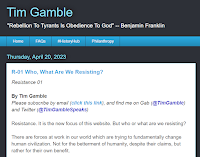By Tim Gamble
(Please Subscribe to this website by Email.)
September is National Preparedness Month. For my general outline of preparedness, see my first article in this series (article link). The next 17 articles in this series are more detailed looks at various aspects of preparedness. In this article, I want to look at a much more advanced and scary subject - nuclear war preparations.
As horrible as it is to contemplate, the possibility of a nuclear war, either all-out or limited in scope, is real. Unless you die instantly from a direct hit from a nuclear warhead, you will survive the initial nuclear attack and have to deal with its aftermath. How do we do so? How do we prepare for nuclear war and its aftermath? Here are some ideas and resources to get you started:
1) David Kobler (aka SouthernPrepper1) has a book, entitled Nuclear War Survival: A One Hour Crash Course - Learn the basics fast, just in case. It is a short book that is exactly what it says it is - a crash course covering the basics for nuclear war survival. Only $8.99 for the paperback at Amazon.
2) The 1987 edition of Cresson H. Kearny's Nuclear War Survival Skills is available for free download at http://www.oism.org/nwss/. This is the highly-recommended classic nuclear war survival guide commissioned by the US government. It is also a good idea to have a hard copy of this book instead of relying solely on a digital copy. The paperback of the 2022 edition is available on Amazon. This book is often recommended by Pastor Joe Fox (aka Viking Preparedness).
3) Potassium Iodine (KI) tablets are used for radiation poisoning. They are not expensive, and are available without prescription, but learn how and when to use them first*. Click here to find them on Amazon or click here to find them at Refuge Medical.
* According to the CDC "People should take KI (potassium iodide) only on the advice of public health or emergency management officials. There are health risks associated with taking KI." Learn more on the CDC website by clicking here.
However, get them now and put them somewhere you can quickly find them. Once the event happens, it will be too late to order them!
4) SouthernPrepper1 has done many videos over the years on preparing for nuclear, radiological, and EMP events. I highly recommend you look up those videos on his YouTube channel.
5) Nuclear fallout is survivable. Dust kicked up by nuclear explosions can travel great distances, but the good news is that the fallout dust is contaminated by gamma radiation, which degrades very rapidly. You will need to protect your homes/shelters, and especially your skin, eyes, and lungs, for the first 48 to 72 hours after a nuclear event. I recently bought some extra plastic sheeting, tarps, and gorilla tape to build dust barriers (covering windows, doors, attic access points, etc.) from potential nuclear fallout.
6) N95 masks and even those ear loop facemasks we all have now are actually pretty good for protecting against fallout dust (the dust being considerably larger than viruses). Long pants, long sleeves, shoes, safety glasses, ski masks, and gloves also can help protect your skin and eyes. Reduce the amount of exposed skin as much as possible. You don't have to have really expensive gear. If you do want to go the extra step, check out protective suits and N 95 masks on Amazon.
7) You do NOT need a gas mask to protect yourself from nuclear fallout. Again, the irradiated dust particles are quite large compared to viruses or gas molecules, and N95 and even earloop masks will suffice.
8) Keep Preppping. Any nuclear war, even limited in scale, will be disastrous for the economy and for supply chains. All other forms of prepping - from stockpiling food, water, and medical supplies, to establishing a family communications plan - will come in extremely handy in surviving a nuclear war, so keep up and even intensify all your current preparations.
9) Distance + Mass = Safety. This is the important formula to remember in preparing for a nuclear war. The more distance, and the more mass, between you and a nuclear event, the safer you will be. If you live in or very near potential targets (large population centers, important cities, military bases, etc.), you may want to consider moving further away. There likely won't be much advance warning of a nuclear attack.
10) Don't be far from home or your survival retreat when the event happens. Travel back home may be impossible for weeks to months to years, depending on where you are at, the extent of the event, and the scope of the world war that will certainly surround it. Watch world events closely. If you feel that the world is getting closer to a possible nuclear war, I suggest cancelling travel plans.
---------------------------------------------
TimGamble.com is my #Resistance website. I cover politics and current events from a "red-pilled" perspective, as well as providing strategies, information and resources for resisting the forces of tyranny attempting to enslave us all. Much of my attention is given to exposing technocracy, and building alternative systems to those being foisted on us by the technocrats. Please check it out.



No comments:
Post a Comment
Comments are posted without moderation. Use caution when following links. Please keep discussions civil and on-topic.